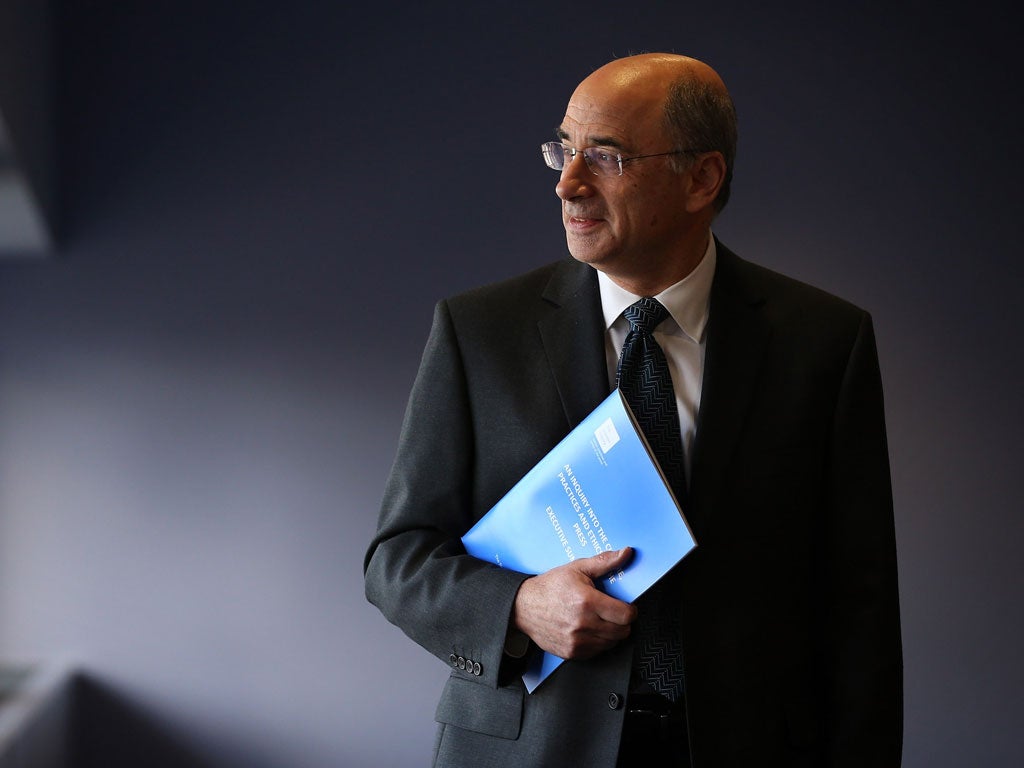Lord Leveson understands that legal back-up could improve the quality of journalism in Britain
Statutory backing could free journalists from fear of massive damages and costs

Your support helps us to tell the story
From reproductive rights to climate change to Big Tech, The Independent is on the ground when the story is developing. Whether it's investigating the financials of Elon Musk's pro-Trump PAC or producing our latest documentary, 'The A Word', which shines a light on the American women fighting for reproductive rights, we know how important it is to parse out the facts from the messaging.
At such a critical moment in US history, we need reporters on the ground. Your donation allows us to keep sending journalists to speak to both sides of the story.
The Independent is trusted by Americans across the entire political spectrum. And unlike many other quality news outlets, we choose not to lock Americans out of our reporting and analysis with paywalls. We believe quality journalism should be available to everyone, paid for by those who can afford it.
Your support makes all the difference.The Leveson recommendations could be very good for journalism. They could free small news organisations to take bigger risks in un-covering the real scandals in public life. This aspect of Lord Leveson’s work has not been presented to the public because the press is so dedicated to throwing out the report that they haven’t actually noticed what it could do to help them.
I, like the Independent’s editor Chris Blackhurst and a host of Fleet Street’s finest, gave evidence to the enquiry and I don’t recognise their characterisation. I met a man who was attentive, probing and actively engaged in trying to see how he could square the circle of self-regulation with legal backing.
He understood that to get people to agree to a measure of self-discipline he would have to throw them a big carrot. And he did – the carrot is the offer of an arbitration system, backed by law, which would provide a first line of defence for all news organisations signed up to a self-regulatory body.
The legal back-up matters. With statutory backing this system could free journalism from some of the fear of massive damages and costs in legal actions taken by those who they investigate. Where they could demonstrate that they had taken reasonable steps to verify their facts and where the work was clearly in the public interest, they would have a far stronger defence against legal challenge than they currently do through the courts - and the costs would be far lower if they were found to have transgressed.
The system Leveson has devised would ensure that litigants who refused to go via the arbitration route, would be unable to claim costs should their claim fail.
Such a system does two things: it provides free access to redress for ordinary people who are regularly traduced by the ‘popular’ press (less regularly by the rest of the press) and it stays the hand of those with deep pockets who currently use the courts to prevent the press exposing their business arrangements.
Companies who have taken legal action against newspapers in the past, (such as Tesco in the case of the Guardian), would be directed to use the tribunal route, rather than go straight to court. That would give newspapers the opportunity to plead public interest, or apologize for mistakes made 'in good faith', rather than facing possible ruinous court action which has a far more chilling effect than any 'back-stop' regulator.
This system could work if it was well drafted but that requires a group of newspaper editors to stand clear of the pack, back Leveson and use their pages to campaign for the best possible law which really does protect journalism in the public interest.
Join our commenting forum
Join thought-provoking conversations, follow other Independent readers and see their replies
Comments